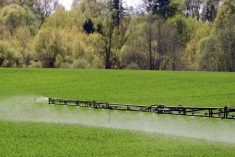A significant “infrastructure deficit” is taxing Canada’s ability to get products to market and should be addressed immediately, says the president of the Canadian Chamber of Commerce.
Perrin Beattie says federal and provincial governments must focus on fostering positive investment climates that encourage private-sector spending on infrastructure, including pipelines and railways.
He also encouraged government to ensure that unnecessary regulatory obstacles and domestic trade barriers are removed.
“When you look at the breadth of infrastructure that we have in Canada, it’s obvious that we’re suffering from a serious infrastructure deficit,” Beattie said May 12 at a Saskatchewan Chamber of Commerce event in Saskatoon.
Read Also

Alberta crop conditions improve: report
Varied precipitation and warm temperatures were generally beneficial for crop development across Alberta during the week ended July 8, according to the latest provincial crop report released July 11.
“Whatever money the federal government is going to be able to put into the country’s infrastructure, it will not be enough to close that gap.”
Beattie, a former Conservative MP and cabinet minister from the 1970s, 1980s and 1990s, said Ottawa needs to target its infrastructure spending carefully.
It should also look for ways to “unleash” private sector capital that “doesn’t require (public) borrowing and doesn’t come from the taxpayers’ account.”
“In the case of pipelines, we’re talking about private money coming from the companies themselves,” he said.
“We’re talking about billions of dollars that would be going into construction. At the end of the day … those pipelines will enable us to get our products to world markets.”
Beattie said pipeline investments would free up significant capacity on the country’s railway networks.
For their part, the railways have said deregulating the industry would result in a greater level of investment in the system.
In particular, they point to maximum revenue entitlements for grain, also known as the revenue cap, as a major impediment to investment and infrastructure renewal.
By contrast, western Canadian farmers and grain shippers are generally opposed to removing the cap.
They say regulatory measures, including the cap, are needed to keep grain freight rates in check and ensure a reasonable level of service for the grain industry.
Despite objections from most prairie farm groups, a recent review of the Canadian Transportation Act recommended that the revenue cap be gradually removed over seven years in an effort to create a more “commercially grounded” rail transportation system.
Beattie said the Canadian Chamber of Commerce is still studying the CTA report and has not taken a position on specific elements within the report, including the cap.
“We are still studying the report,” he said.
“In general, it was a very good report we thought … (but) we haven’t taken firm positions on specific elements of the report so far.”
Steve McLellan, chair of the Saskatchewan Chamber of Commerce, said disputes over regulatory issues can be settled if parties on both sides of the issue are committed.
The key is getting the right people engaged in discussions and ensuring that political support is in place when solutions are found.
McLellan said timely pipeline approvals are critical to ensuring that additional railway capacity is available for Saskatchewan’s major commodities, including grain and potash.
He said the Saskatchewan Chamber of Commerce is interested in ensuring that National Energy Board approval processes do not create unnecessary delays that could impede pipeline investments.
As for the CTA review, McLellan said the Saskatchewan chamber is still reviewing the report’s recommendations and consulting with the province’s business community to determine “what the outcomes could be and where they could be enhanced…. Overall, we’re quite happy with the CTA (report) … but we haven’t taken a position on exactly what should happen with it.”
Contact brian.cross@producer.com

















